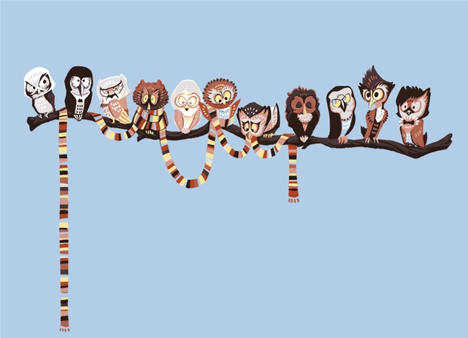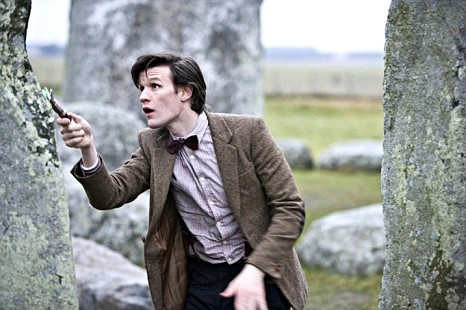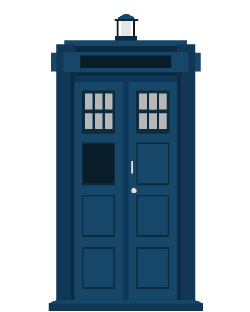

Doctor Who is a British science fiction television programme produced by the BBC. The programme depicts the adventures of a Time Lord a time travelling, humanoid alien with two hearts known as the Doctor. He explores the universe in his 'TARDIS', a sentient, telepathic time-and-space-travel machine that flies through the time vortex. Its exterior appears as a blue British police box, a common sight in Britain in 1963, when the series first aired. Along with a succession of companions, the Doctor faces a variety of foes while working to save civilisations, help ordinary people, and right wrongs.

The show has received recognition from critics and the public as one of the finest British television programmes, including the 2006 British Academy Television Award for Best Drama Series and five consecutive (2005–10) wins at the National Television Awards under Russell T Davies' reign as Executive Producer. In 2011, Matt Smith became the first Doctor to be nominated for a BAFTA Award for Best Actor in a Leading Role. The programme is listed in the Guinness World Records as the longest-running science fiction television show in the world and as the "most successful" science fiction series of all time—based on its over-all broadcast ratings, DVD and book sales, and iTunes traffic. During its original run, it was recognised for its imaginative stories, creative low-budget special effects, and pioneering use of electronic music (originally produced by the BBC Radiophonic Workshop).
The show is a significant part of British popular culture; and elsewhere it has become a cult television favourite. The show has influenced generations of British television professionals, many of whom grew up watching the series. The programme originally ran from 1963 to 1989. After an unsuccessful attempt to revive regular production in 1996 with a backdoor pilot in the form of a television film, the programme was relaunched in 2005 by Russell T Davies who was showrunner and head writer for the first 5 years of its revival, produced in-house by BBC Wales in Cardiff. Series 1 in the 21st century, featuring Christopher Eccleston as the ninth incarnation, was produced by the BBC. Series 2 and 3 had some development money contributed by the Canadian Broadcasting Corporation (CBC), which was credited as a co-producer.[8] Doctor Who also spawned spin-offs in multiple media, including Torchwood (2006), The Sarah Jane Adventures (2007), K-9 (2009), the four-part video series P.R.O.B.E. (1994), and a single pilot episode of K-9 and Company (1981). There also have been many spoofs and cultural references of the character in other media.

Eleven actors have headlined the series as The Doctor. The transition from one actor to another is written into the plot of the show as regeneration, a life process of Time Lords through which the character of the Doctor takes on a new body and, to some extent, new personality, which occurs when sustaining injury which would be fatal to most other species. Although each portrayal is different, and on occasions the various incarnations have even met one another, they are all meant to be aspects of the same character. The Doctor is currently portrayed by Matt Smith, who took up the role after David Tennant's final appearance in an episode broadcast on 1 January 2010.


Doctor Who first appeared on BBC television at 17:16:20 GMT on 23 November 1963, following discussions and plans that had been in progress for a year. The Head of Drama, Canadian Sydney Newman, was mainly responsible for developing the programme, with the first format document for the series being written by Newman along with the Head of the Script Department (later Head of Serials) Donald Wilson and staff writer C. E. Webber. Writer Anthony Coburn, story editor David Whitaker and initial producer Verity Lambert also heavily contributed to the development of the series. The programme was originally intended to appeal to a family audience, as an educational programme using time travel as a means to explore scientific ideas and famous moments in history. On 31 July 1963 Whitaker commissioned Terry Nation to write a story under the title The Mutants. As originally written, the Daleks and Thals were the victims of an alien neutron bomb attack but Nation later dropped the aliens and made the Daleks the aggressors. When the script was presented to Newman and Wilson it was immediately rejected as the programme was not permitted to contain any "bug-eyed monsters". The first serial had been completed and the BBC believed it was crucial that the next one be a success, however The Mutants was the only script ready to go so the show had little choice but to use it. According to producer Verity Lambert; "We didn't have a lot of choice—we only had the Dalek serial to go...We had a bit of a crisis of confidence because Donald [Wilson] was so adamant that we shouldn't make it. Had we had anything else ready we would have made that." Nation's script became the second ever Doctor Who serial – "The Daleks" (aka "The Mutants"). The serial introduced the eponymous aliens that would become the series' most popular monsters, and was responsible for the BBC's first merchandising boom.
Home